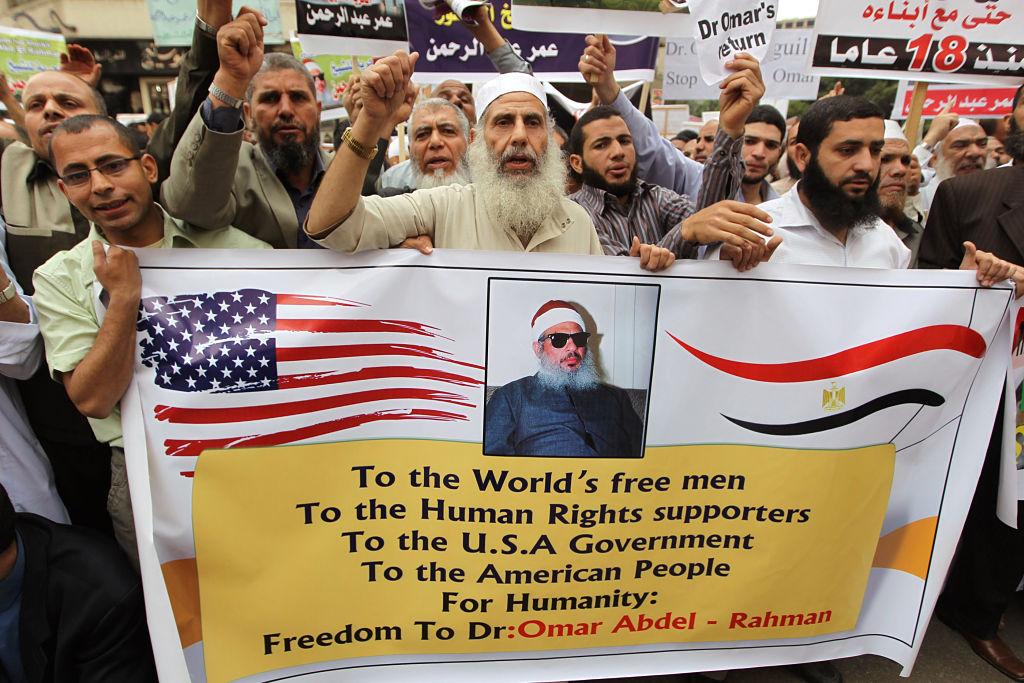‘Blowback’ in Tahrir
Supporters of Egyptian cleric Sheikh Omar Abdel Rahman demonstrate to call for his release in front of the U.S. Embassy in Cairo on April 21, 2011. Abdel Rahman, was jailed for life in January 1996 for his role in terrorist attacks, including bombing the World Trade Center in New York City in February 1993.
CAIRO – Here’s a full-circle vignette from nearly 20 years of reporting on Islamic militancy.
It involves the son of blind Egyptian sheikh from the Oasis of Faiyoum and it offers a glimpse into just how dramatic, and worrisome, are some of the changes unfolding here after the January 25 revolution that toppled Hosni Mubarak.
I was in Tahrir Square reporting Thursday and came across a small group of protesters holding placards that featured a picture of a blind Egyptian cleric and proclaimed “Free Sheik Omar Abdel Rahman.” The cleric is now being held in a New York maximum security prison on charges that he inspired a cell of Islamic militants to blow up the World Trade Center twin towers in 1993 by placing a truck bomb in the parking garage and a larger plot to try to blow up other New York landmarks.
As it turned out, the leader of the small crowd in Tahrir Square was actually the sheikh’s son, Abdel Rahman. He is 31 years old now and a civil engineer in Faiyoum.
I had first met him when he was a 13-year-old boy and I was reporting on the suspects in the aftermath of the bombing, including Sheikh Omar Abdel Rahman. Back then, I found his son in front of their home and he guided me up a dingy apartment stairwell that was scrawled with Islamic graffiti calling for the death of Mubarak. I never got past a crack in the door of the family home. His wife and one of his other sons looked out in fear.
It was a time when Mubarak was undertaking a brutal crackdown on Islamic militants and Sheikh Omar Abdel Rahman’s group, known as Gamaa Islamiyya, was in an open war against the police. This was perhaps the height of Mubarak’s brutality in the 30 years of his oppressive regime. There was systemic torture in Egyptian prisons and military courts were hanging suspected terrorists routinely. America kept the money coming to Mubarak and kept propping up his regime year after year while the anger of the militants grew against the country that supported a man they saw as a tyrant.
Gamaa al Islamiyya openly called for Mubarak’s assassination, and they meant business. After all, they played a role in the assassination of Anwar Sadat. In retrospect, you could say this was where America’s desire for “stability” in the region began to eclipse its belief in democracy for the region. It was Washington’s desire to crack down on the threat of terrorism that trumped its high ideals of spreading democracy.
I was with the New York Daily News back then, following the trail of the suspects in the botched World Trade Center attack and my research had taken me to Egypt via Brooklyn and Jersey City, where this ragtag collection of Egyptian, Sudanese, Palestinian and Pakistani jihadists came together. Their spiritual leader was sheikh Omar with his signature Ray-Ban sunglasses and the red felt hat worn by the graduates of the esteemed theological institute known as Al Azhar.
And as it turned out, they were all bound by their service in fighting against the Soviet Union in Afghanistan with the U.S.-backed “mujahadeen,” or “freedom fighters” against the Soviet Union. Now these fighters had switched sides and were turning against the United States, feeling that the support the U.S. provided was a cynical chapter in the Cold War and that they had been played. Hard to argue otherwise, really. This phenomenon of the mujahadeen turning against the U.S. is, in the parlance of the CIA , known as “blowback.”
In retrospect, the recruits coming together for the first World Trade Center attack were nascent Al Qaeda and not the FBI nor the CIA nor any journalists I know of could sense just how ominous a force was gathering.
And the first face of Al Qaeda in America really was this group led by Sheikh Omar and his Gamaa al Islamiyya, or “the Islamic Group.” In Egypt, the face was well known as the group was responsible for many bloody chapters in Egypt, including the killing of tourists in an attempt to cripple the tourism industry and the killing of Christians in an attempt to intimidate the minority.
Now, all these years later, here was that kid I had met. He is the son of the blind cleric only now he is sturdy, bearded and chanting loudly and publicly that his father should be freed. The underground militant organization, Gamaa al Islamiyya, that his father established and helped steer on its murderous path is now registering as an official political party in the “new Egypt.”
There are heady moments in Tahrir Square where the idea of revolution – people coming together to overturn a system that is corrupt and brutal – can be intoxicating. And there are encouraging signs, like the U.S. government opening dialogue with Islamist movements that reject violence such as the powerful and politically organized Muslim Brotherhood. But there are also moments of dread, and seeing Gamaa Islamiyya transforming into a political party is one of those moments. This is a new form of “blowback” and the striking absence of memory is particularly worrisome for those who know its bloody history.
We want to hear your feedback so we can keep improving our website, theworld.org. Please fill out this quick survey and let us know your thoughts (your answers will be anonymous). Thanks for your time!
